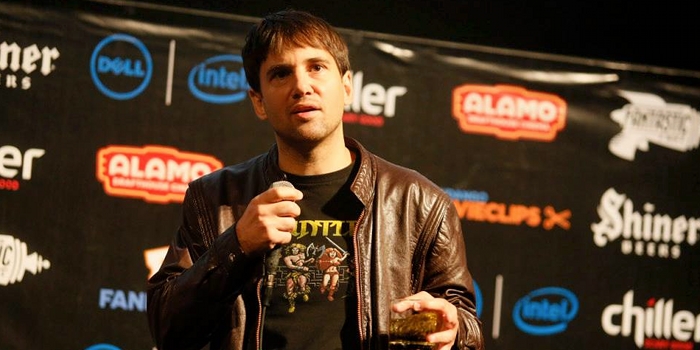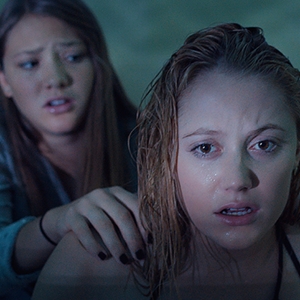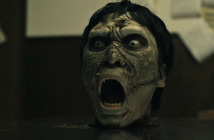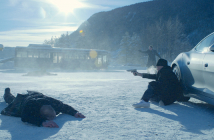
Editor’s Notes: The following review is part of our coverage of the 2014 Fantastic Fest. For more information on the festival visit fantasticfest.com and follow Fantastic Fest on Twitter at @fantasticfest.
Fantastic Fest Day 2. 8:30 am. I am seated for a press screening of David Robert Mitchell’s It Follows without a single bit of caffeine in my body. I pray to the Fantastic Fest gods that they will keep my body awake for the movie so I can reward myself with coffee after the film ends. About 107 minutes later, my heart was still pounding so hard from what I had just watched that I no longer had any need for coffee. I would remain coffee-less for the rest of the day.
Following his The Myth of the American Sleepover by venturing into a completely different genre, Mitchell, in a way that almost seems effortless, instills in his sophomoric outing a sense of dread in both the film and its audience an overwhelming sense of dread that lingers long after the credits roll. I sat down with David to discuss the process of the bringing something intangible to terrifying life on the big screen. The young director, dressed unassumingly casual in a t-shirt, hoodie and jeans, revealed the inspiration for his story stemmed from his childhood.
“The idea came from a recurring nightmare I had when I was a kid, being followed by something that looked like different people. It was very slow, so I could always get away from it. The disturbing aspect of it was knowing I could get away but that it was always coming for me. I always remembered that. Years later as an adult I kept thinking about some of the images from that nightmare, and then built on top of that by adding the idea of people being connected physically and emotionally through sex.”

Much of the driving force in the film revolves around sex, with Jay (Maika Monroe) finding that she sees creepy beings following her casual sexual encounter with a boy in the backseat of the car. She learns only people who have slept with someone who can see the creatures following her can see them, but it is their one and only goal in life to kill the people that can see them. Mitchell constantly litters the backgrounds of his shots with people, sometimes not even letting us know if they are real or not. Naturally the film erupts into terrifying and violent clashes, but Mitchell found the underlying feeling of constant dread to be the true star of the film.
“I felt it when I wrote it, and that was what I was hoping for. The movie is about dread, about anxiety. The goal was that hopefully watching it you feel that. Yes, there are moments of chaos and moments where it gets a little bit crazy, but to me it’s about a level of dread that is persistent. That’s what was interesting to me about the film. It was in the script, and that’s when I felt it the most.”
While his childhood nightmare may have inspired his script, David relied less on his emotions during the actual shooting and approached telling his story in a more practical manner.
“It’s impossible to have that feeling constantly. It’s about remembering what the feeling is and then finding a way to achieve. You can’t walk through production feeling that sense of dread. It’s too difficult to maintain. Truth is, I only felt it intensely when I first wrote it. From that point on, it’s about trying to remember what I felt and intellectually try to achieve that. It’s impossible to maintain that level of feeling with something when the physical act of filming each shot makes it impossible to feel that level of anxiety in a single shot. For me, it’s about remembering what I felt and then having faith that it would piece together that way for an audience. It’s tricky, though.”
While some directors may find it hard branching out into different genres, Mitchell was ready for the challenge and approached it the way he felt would service his story best.
“It’s a different approach. When you have a scene in a drama where two characters are talking to each other, you can feel it in the moment. You can connect to it in that moment, you can connect to that feeling based on the performance of the actors. The intensity of the feeling in a scene in a horror film is more about believing that it is there and believing that it is there and trying to get what you need to accomplish in order to make other people connect with the feeling you had at some point in the past.”
Having exhausted our examination of his directorial process, our conversation turned to how David worked with his actors. When one knows the emotions and tone he wants to communicate, how does he communicate this to his actors while still allowing them room to do their own thing?
“They have their process for sure, and then it’s about a certain amount of communicating what I want from a scene. And then they are bringing all kinds of wonderful things to it. And then it’s about just being able to play to what that character is experiencing and going through. For Jay, it’s about reacting to some strange person walking into her room, and that’s a very disturbing thing. And then for the friends who can’t see that, it’s about reacting to the fear and pain and terror that their friend is experiencing. That is what’s scary to them, seeing their friend in this terrible situation and not understanding what it is or what to do about it. It just depends.”
They say writing is always the hardest, but most important part of telling a story. So what advice did David have for those hoping to tell their own stories?
“For me, I have to pick a period of time where I do nothing but write. I have a certain amount that I try to accomplish every day, and then I just hold myself to it and don’t do anything but write. I suppose maybe it sounds like a form of torture, but truth is I actually like it. I kinda have to put myself in a certain space. But this one came pretty quick.”





Pingback: yellow october()